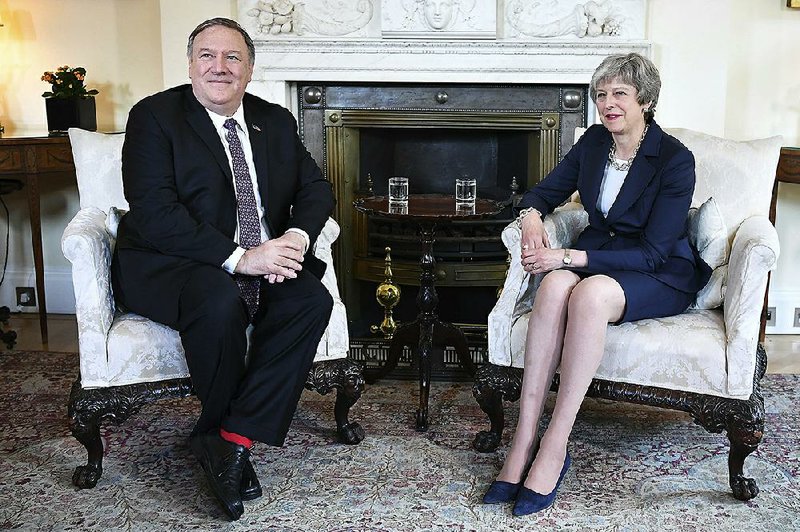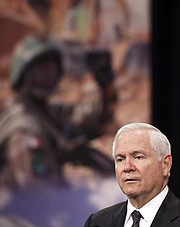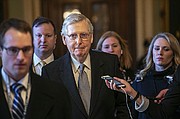WASHINGTON -- U.S. Secretary of State Mike Pompeo on Sunday dropped plans to visit Moscow, though he is still scheduled to visit Russia this week amid hopes for improved relations.
A State Department official said late Sunday that Pompeo had changed his schedule and left for Brussels, where he will discuss Iran and other issues with European officials. Pompeo had been scheduled to meet today with American diplomats at the U.S. Embassy in Moscow.
Pompeo is expected to meet Tuesday in Sochi with Russian President Vladimir Putin and Foreign Minister Sergey Lavrov. The State Department official wasn't authorized to discuss the itinerary and requested anonymity.
The visit to Russia will be Pompeo's first as secretary of state and comes as President Donald Trump is calling for improved ties with the Russians.
The U.S. has renewed its focus on Russian relations after the conclusion of special counsel Robert Mueller's investigation into Russian interference in the 2016 presidential election. Trump and Putin had largely kept their distance during the investigation.
Pompeo could use his trip to start laying the groundwork for a meeting between Trump and Putin on the sidelines of a Group of 20 forum in Japan that's scheduled for late June. Political analysts said such an encounter would still be fraught.
"The Mueller report confirmed accusations of Russian meddling," said Andrey Kortunov, director general of the Russian International Affairs Council, a Kremlin-founded think tank. "The report to some extent rehabilitates Trump but doesn't rehabilitate Moscow at all. For Russia, nothing has really changed."
While Trump may want better ties with Russia, relations between the two countries have seldom been worse.
The two countries have split over Russia's support for Venezuelan President Nicolas Maduro, and there is the issue of the U.S.' withdrawal from the 1987 Intermediate-Range Nuclear Forces Treaty in February. The U.S. administration is also angry at Russia for its detention of 24 Ukrainian sailors in the Sea of Azov in November and for its poisoning of a former spy in the U.K. last year.
But Trump's calls for improved ties are likely to find a receptive audience in Russia. After the Mueller report's release, Russian lawmaker Konstantin Kosachyov urged the president to "take the risk" and seize the opportunity to reset relations.
"Putin knows Trump likes him, while [Trump's] administration does not," said Vladimir Frolov, a former Russian diplomat and foreign policy analyst in Moscow. "In Trump he trusts."
Senate Minority Leader Charles Schumer wrote to Pompeo ahead of his trip, insisting the secretary of state make it clear to Putin that "any action to interfere in our elections will be met with an immediate and robust response."
"President Trump's approach to dealing with President Putin, especially on this vital issue, must change," the New York Democrat wrote Sunday in a letter posted on Twitter.
CONFRONTING RUSSIA
Former U.S. Defense Secretary Robert Gates also said Trump needs to confront Putin about Russian interference -- not just in the 2016 U.S. election, he said, but also in Britain's vote to leave the European Union and in French elections.
Gates, speaking on CBS' Face the Nation, also criticized Senate Majority Leader Mitch McConnell's declaration last week that it was "case closed" on the Russian investigation and time for the country to move on from Mueller's report.
"The piece of the Mueller report about Russian interference is not 'case closed,'" said Gates, a Republican who was defense secretary under Presidents George W. Bush and Barack Obama. "And, frankly, I think elected officials who depend on honest elections to get elected ought to place as a very high priority measures to protect the American electoral system against interference by foreigners."
Gates said the United States has "not reacted nearly strongly enough" to Russia's "blatant interference in 2016," noting that Trump talked with Putin by phone earlier this month but did not raise concerns about the possibility of Russian interference in 2020.
"I think he should've said, 'We've had this discussion, the evidence is in, and don't ever do this again or there will be consequences for Russia,'" Gates told host Margaret Brennan. "I think he very much should have raised it with him."
Gates, who is now chancellor of the College of William & Mary in Virginia, speculated that Trump may be hesitant to confront Russia because of a "peculiar relationship with Putin" or because he "feels like any acknowledgment of Russian involvement in the 2016 elections somehow delegitimizes his being elected president."
"I don't know what the mix of motives are," Gates said. "But the interesting thing is everybody around the president actually has a much more realistic view of the Russians."
In a series of tweets Sunday, Trump focused on Democrats' response to Mueller's report, saying they were "acting like crazed lunatics" and perpetrating "a big hoax, the biggest in American history."
"When the Mueller Report came out showing NO Collusion with Russia (of course), it was supposed to be over, back to work for the people," Trump tweeted. "But the Dems have gone 'nuts,' and it has actually gotten worse! Hope the Republicans win back the House in 2020, or little will get done!"
SEEKING CLARITY
Democrats on Capitol Hill are pushing for Mueller, who is still an employee of the Justice Department, to testify before the House Judiciary Committee. But hopes that Mueller would testify this week appear to have faded as behind-the-scenes talks drag on.
In the meantime, plenty of people are itching to get a firsthand update from Mueller. Many Americans are unlikely to read Mueller's full 448-page report, and some of them say they hope he will testify about what he really thinks.
Without that testimony, "it's almost like going off of hearsay," says Michelle Martin, a 48-year-old physician's assistant from Round Rock, Texas. "You have to have the facts to make an educated opinion."
"I would just ask him to sum it up because he knows it the best," said Melissa Garcia, 29, a health counselor in Quakertown, Pa., who supported Hillary Clinton in the 2016 election. "I'd want the shorthand version but the most important details."
Garcia compared the two-volume Mueller report to the kind of "terms and conditions" legalese that most consumers skip right over, saying she'd love a "CliffsNotes version" from Mueller himself.
Republican Becky McBreen, 58, is a Trump supporter from Schuylkill Haven, Pa., who works at an aluminum company. She said she'd like to ask Mueller: "Leaving out the political bias, do you, in your heart of hearts, truly think that Trump colluded with Russia to sabotage Hillary?"
Mueller's report did not find evidence of a criminal conspiracy between Russia and the Trump campaign.
Rep. Debbie Dingell, D-Mich., is on her second reading of Mueller's report, and she said she still has questions.
"That's why we need him to testify," she said. "I think he owes it to us."
Richard Ben-Veniste, who served as one of the lead prosecutors on the Watergate investigation, said Mueller "probably could have been clearer."
"It would certainly be in the public interest for Robert Mueller to answer questions, clarify and expound upon his investigation and his report," Ben-Veniste said.
Information for this article was contributed by Nick Wadhams, Ilya Arkhipov and Henry Meyer of Bloomberg News; by Felicia Sonmez and Aaron Blake of The Washington Post; and by Matthew Lee, Nancy Benac, Mary Clare Jalonick, Lisa Mascaro, Michael Rubinkam, Clarice Silber and Ellis Rua of The Associated Press.
A Section on 05/13/2019


